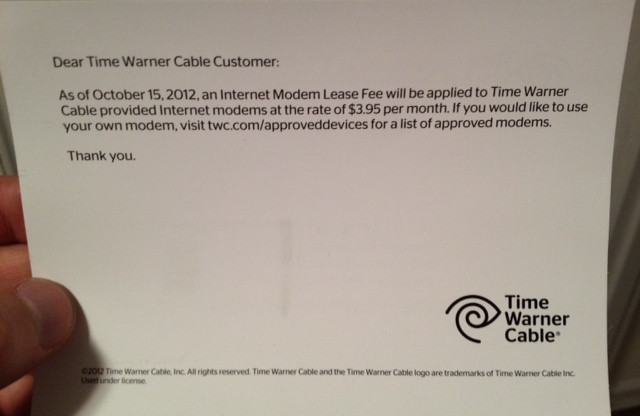Two Class-Action Suits Filed Over Time Warner Cable’s Modem Rental Fee Image courtesy of A friendly notice from TWC
The suits, filed in the Superior Court of New Jersey and the Supreme Court of New York, allege that, among other things, TWC violated its own Terms of Service by not providing enough notice to customers about the fees. The plaintiffs also claim that TWC told customers they could avoid the fee by using a modem they purchase, it failed to inform customers about the possible problems of using a personal modem — like not being able to access TWC’s phone service.
The flimsy postcard, seen above, is at the heart of many of the allegations in the lawsuits. First, it was sent out too close to the start of the fee, claim the plaintiffs.
The TWC Terms of Service seem pretty clear on the amount of time required for these kinds of announcements:
Pricing and Service Changes
Unless otherwise provided by applicable law, Time Warner Cable will notify you 30 days in advance of any price or service change. Notice of these changes may be provided on your monthly bill, as a bill insert, as a separate mailing, in the Legal Notice section of the newspaper, on the cable system channel(s) or through other written means.
While we suppose that a plain white postcard might count as “other written means,” or a “separate mailing,” the plaintiffs say that TWC failed to do its best to make sure that all customers were notified of the upcoming change.
“It’s a massive hi-tech consumer fraud accomplished by low-tech methods,” says lead lawyer Steven L. Wittels. “Send customers confusing notice of the fee in a junk mail postcard they’ll throw in the garbage, sock them with a $500 million dollar a year rate hike, then announce on your website that customer satisfaction is your #1 priority.”
In addition to the problems with third-party modems being useless for TWC phone customers, the lawsuits claim that customers were misled by the cable company’s Terms of Service which state that “Time Warner Cable will repair and/or replace the equipment we use to provide your services at no charge.”
The biggest concern is whether or not these cases will get their day in court, as TWC recently updates its subscriber agreement to include a forced arbitration clause that would seem to negate any attempt to bring a class-action against the cable company.
But Wittels points out to Consumerist that Section 15 (b) of the TWC subscriber agreement states that “claims for injunctive orders or similar relief must be brought in a court.” [italics for emphasis] And since the case is seeking an injunction against TWC’s modem fees, he argues that the company’s own agreement compels this to go before a judge.
Additionally, the suit seeks to “invalidate the unconscionable class action waiver and arbitration clause” in the TWC subscriber agreement. Again, the complaint turns TWC’s own document against the defendant:
Section 15(d) of Defendant’s Subscriber Agreement anticipates that this provision is susceptible to legal challenge, and acknowledges: “If the prohibition against class action and other claims brought on behalf of third parties contained in Section 15(b) is found to be unenforceable, then all of Section 15 will be null and void.”
The complaint says that even though TWC is allegedly pulling in $40 million a month from these fees, the individual monthly payments are so small, “it makes no financial sense for an individual customer to challenge the monthly surcharge, aside from the fact that many customers don’t even realize they’ve been defrauded.
“With this declaratory and injunctive action, and class action, however, consumers have tools they can use to even the playing field, to make sure that companies like Time Warner engage in fair and upright business practices,” the complaint continues. “Plaintiff therefore seeks an individual, declaratory, injunctive and/or class remedy to enjoin Defendant Time Warner Cable from continuing its dishonest modem lease fee billing practices, and to return to Plaintiff and the Class all misappropriated lease modem surcharges thus far collected.”
A TWC rep declined to comment on the suits.
Want more consumer news? Visit our parent organization, Consumer Reports, for the latest on scams, recalls, and other consumer issues.


